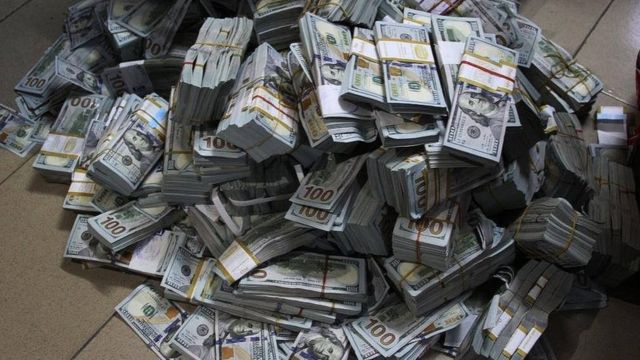Breaking News
Bill on prohibition of foreign currency use in Nigeria passes First Reading in senate
Senator Nwoko clarified that transitioning domiciliary account balances to Naira would be a voluntary process for account holders. As the Naira strengthens, the need to hold foreign currencies would diminish, making the transition seamless.

The Senate has initiated steps to restore Nigeria’s monetary sovereignty by outlawing the use of foreign currencies for payments and transactions within the country.
The proposed legislation, aimed at ensuring all payments—including salaries and transactions—are conducted in Naira, seeks to eliminate discriminatory practices and strengthen confidence in the local currency. This includes making it mandatory for exports to be paid for in Naira.
The bill, titled “A Bill for an Act to Alter the Central Bank of Nigeria Act, 2007, No. 7, to Prohibit the Use of Foreign Currencies for Remuneration and for Other Related Matters,” is sponsored by Senator Ned Munir Nwoko, Chairman of the Senate Committee on Reparations and Repatriation.
According to Senator Nwoko, the widespread use of foreign currencies in Nigeria’s financial system undermines the value of the Naira, perpetuating economic challenges. He described the use of the Dollar, Pound Sterling, and other foreign currencies for domestic transactions as a colonial relic that continues to hinder Nigeria’s economic independence.
Prohibits salaries, transactions, and payments in foreign currencies, ensuring all workers, including expatriates, are paid in Naira.
Requires crude oil and other exports to be sold exclusively in Naira, compelling international buyers to purchase the currency and driving its demand and value.
Positions the Naira as the central currency for all financial operations, reinforcing its dominance in the economy.
Seeks to abolish informal currency markets that undermine the formal economy and encourage unethical practices such as round-tripping by banks.
Directs banks to provide loans at affordable interest rates to stimulate industrialization and economic growth.
Advocates for storing Nigeria’s foreign reserves domestically to safeguard the country’s economic sovereignty and reduce exposure to external vulnerabilities.
Reclaim monetary independence by prioritizing the Naira for both domestic and international transactions.
Increase the currency’s value through higher demand driven by its exclusive use for exports.
Foster fairness in salary payments by standardizing remuneration in Naira for both local and expatriate workers.
Support the manufacturing sector with accessible credit facilities to encourage local production and reduce dependency on imports.
Foster national pride and economic self-reliance by reducing reliance on foreign currencies.
Build a diversified and resilient economy through coordinated monetary and fiscal policies.
Senator Nwoko clarified that transitioning domiciliary account balances to Naira would be a voluntary process for account holders. As the Naira strengthens, the need to hold foreign currencies would diminish, making the transition seamless.
He also assured Nigerians that access to foreign exchange for travel and other legitimate purposes would be streamlined through banking reforms, alleviating concerns about access to Basic Travel Allowance (BTA) and other forex needs.
Drawing parallels with Morocco, Senator Nwoko noted the stability of the Moroccan Dirham, which has maintained consistent value against major currencies for over 35 years. He attributed this to Morocco’s policy of exclusively using its local currency for domestic transactions.
With its vast natural resources and a dynamic population, Nigeria is well-positioned to surpass Morocco’s achievements, provided there is a paradigm shift in how Nigerians perceive and use the Naira.
The bill envisions a future where Nigerian banks expand internationally, offering innovative financial tools like cashless wallets to simplify global transactions. These measures aim to address existing challenges, such as the inability of Nigerian debit cards to facilitate international online transactions, while making domiciliary accounts increasingly unnecessary.
If passed, this legislation could mark the beginning of a transformative era, driving economic growth, cultural pride, and sustainable development anchored in the strength of Nigeria’s currency—the Naira.









